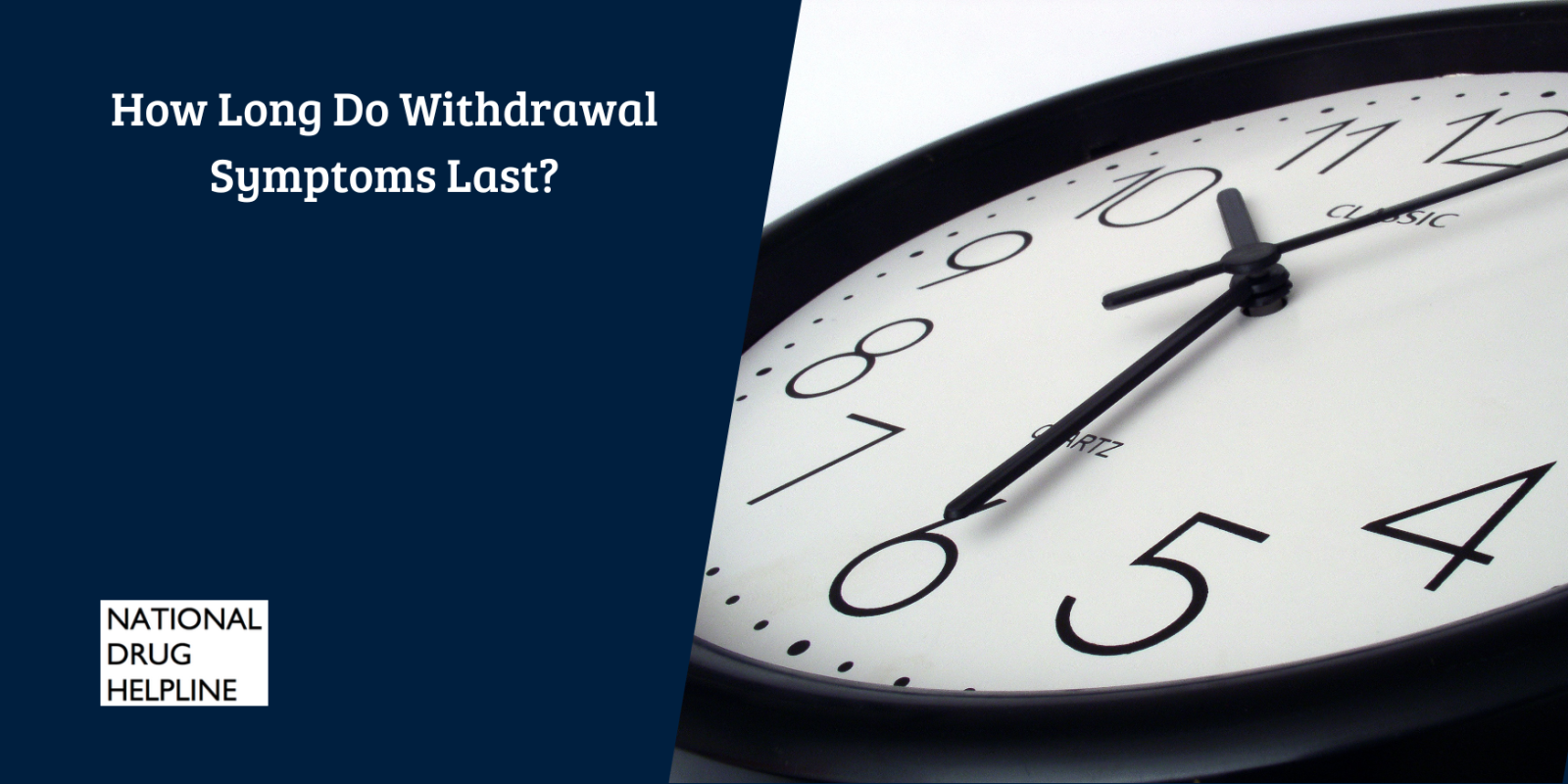While recovering from substance abuse, the most challenging part are the withdrawal symptoms. Whether you are trying to get over your physical dependency on alcohol, prescription drugs, or illicit substances, symptoms of withdrawal can give both physical and psychological discomfort. Therefore, it is important to understand how these symptoms can impair your recovery journey.
How Long Do Withdrawal Symptoms Last?
Withdrawal symptoms can vary in duration based on multiple factors such as the duration of use, the substance, and the frequency of use. Other factors that affect withdrawal duration include age, metabolism, and overall health. Usually, the duration of withdrawal symptoms range from a few days to several weeks.
Symptoms of withdrawal based on the substance are:
Alcohol Withdrawal
After stopping alcohol, withdrawal symptoms begin within 6 hours. Early symptoms of alcohol withdrawal are tremors, anxiety, nausea, and insomnia. Gradually, symptoms intensify and peak between 24 to 72 hours. During this period, some may experience hallucinations, increased blood pressure, rapid heartbeat, and seizures[1].
In severe cases, delirium tremens (DTs) may develop, which may be life-threatening. Symptoms begin to subside after 7 to 10 days. However, the psychological symptoms, such as sleep disturbances and anxiety, may persist longer.
Opioid Withdrawal
Withdrawal symptoms from opioids begin 8 to 24 hours after the last dose. The timing of onset depends on whether the opioid used is short-acting or long-acting. Symptoms such as muscle aches, anxiety, sweating, and a runny nose begin early on. Nausea, vomiting, diarrhoea, dilated pupils, and abdominal cramping are other symptoms that may occur as withdrawal progresses[2].
Symptoms peak at around 72 hours after stopping opioids and generally last between 4 to 10 days. While withdrawing from long-acting opioids such as methadone, symptoms may start earlier and may persist for several weeks. Additionally, psychological symptoms such as cravings, depression, and anxiety may linger.
Benzodiazepine Withdrawal
Withdrawal symptoms of benzodiazepines can be particularly dangerous. Symptoms begin a few days after cessation because of the longer half-life of many benzodiazepines. Some common symptoms of withdrawal are anxiety, panic attacks, sleep disturbances, and irritability[3].
In severe cases of withdrawal, people may experience tremors, hallucinations, and seizures. Symptoms peak from the second week of withdrawal but it can last for several months, specially in cases of long-term or high-dose usage. It is not uncommon to have protracted withdrawal syndrome and may include persistent anxiety, depression, and cognitive impairment.
Stimulant Withdrawal
Withdrawal from stimulant drugs such as cocaine begins within hours after the last use. In contrast to alcohol or benzodiazepines, stimulant withdrawal is usually not physically dangerous, but it can be emotionally challenging.
Symptoms of cocaine withdrawal include fatigue, increased appetite, vivid unpleasant dreams, and depression. Many experience a crash almost immediately after stopping the stimulant drug. A crash is characterized by exhaustion, irritability, and inability to feel pleasure. Although most symptoms resolve within a week, the emotional toll may last for weeks or even months.
Common Withdrawal Symptoms
Symptoms of withdrawal mainly fall into two categories: physical and psychological. The severity and type of symptoms depend on the substance and the user.
Physical Symptoms:
- Sweating
- Nausea and vomiting
- Headaches
- Muscle pain
- Insomnia
- Shaking
Psychological Symptoms:
- Anxiety
- Depression
- Irritability
- Mood swings
- Difficulty concentrating
- Cravings
Withdrawal symptoms are often more difficult to cope due to the overlapping mental health conditions. Therefore, it is essential to seek professional help during recovery.

Mental Health and Withdrawal
A deep connection exists between mental health and withdrawal. Coexisting mental health disorders, such as anxiety, PTSD, or depression, can prolong the duration of withdrawal symptoms. These conditions can intensify withdrawal and vice versa, making withdrawal more challenging.
Professional detox programs provide psychological support that helps stabilize emotions and control withdrawal symptoms. To attain long-term recovery, it is important to address both mental health issues and addiction.
Factors That Influence Withdrawal Duration
There are several variables that affect how long the symptoms of withdrawal last, such as:
- Type of drug: There are different substances with varying half-lives and withdrawal timelines.
- Length of use: Long-term usage of any substance leads to more prolonged symptoms.
- Polysubstance abuse: Taking multiple drugs at the same time can further complicate and extend withdrawal.
- Individual biology: Each person has individual genetics, metabolism, and overall health, which play a significant role in deciding the duration of withdrawal.
- Support system: It is essential to have a strong network of support and medical supervision to ease and shorten withdrawal.
Tips to Help With Withdrawal
It can be quite overwhelming to go through withdrawal symptoms. However, the right strategies and support can make it easier to manage the whole process.
- Seek medical supervision: It is important to never attempt to detox alone. This is especially true for substances such as alcohol or benzodiazepines. This can cause life-threatening symptoms.
- Stay hydrated and nourished: While your body works hard to reset and recover, it is essential to fuel it with water, nutrients, and rest.
- Get emotional support: Whether it is through therapy, support groups, or a loved one, you can always seek support, and you need not go through it alone.
- Consider medication-assisted treatment (MAT): Certain medications, under supervised medical guidance, can help ease withdrawal for certain substances.
- Use holistic methods: Practicing yoga, meditation, and breathing exercises can be helpful to better deal with mental health symptoms.
There are certain guides that provide recovery tips on how to quit addiction with tips and tricks for success.
Long-Term Outlook
Although the acute phase of withdrawal lasts only a few days or weeks, the emotional and psychological symptoms can persist for months to years. This condition is called Post-Acute Withdrawal Syndrome (PAWS), and is a major cause of relapse amongst addicts[4].
PAWS can last for several months and even years. Over time, the symptoms gradually decrease with proper treatment. A strong plan for aftercare that includes support groups, therapy, and lifestyle changes is key to long-term recovery.
When to Seek Help
If you or your loved ones are going through withdrawal, you need to seek professional help immediately. You can seek advice from the National Drug Helpline by calling them on (844) 289-0879.
Conclusion
So how long do withdrawal symptoms last? This depends on several personal and medical factors. While most people recover within a few days, some may have lingering symptoms for several weeks or months. What you need to remember is that you do not have to do it all alone.
If you have the proper support, treatment, and resources, it is possible to recover from any type of addiction.
References
| ↑1 | Bayard, Max, et al. “Alcohol withdrawal syndrome.” American family physician 69.6 (2004): 1443-1450. |
|---|---|
| ↑2 | Pergolizzi Jr, Joseph V., Robert B. Raffa, and Melanie H. Rosenblatt. “Opioid withdrawal symptoms, a consequence of chronic opioid use and opioid use disorder: Current understanding and approaches to management.” Journal of clinical pharmacy and therapeutics 45.5 (2020): 892-903. |
| ↑3 | Petursson, H. “The benzodiazepine withdrawal syndrome.” Addiction 89.11 (1994): 1455-1459. |
| ↑4 | Alsheikh, Mona Yaser. “Post-acute withdrawal syndrome: the major cause of relapse among psychoactive substances addicted users.” Archives of Pharmacy Practice 12.4-2021 (2021): 91-97. |

